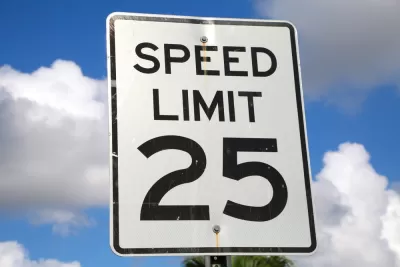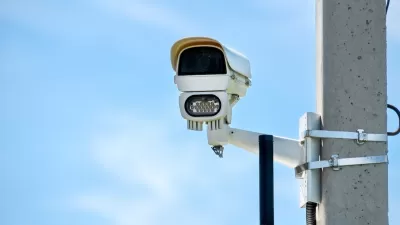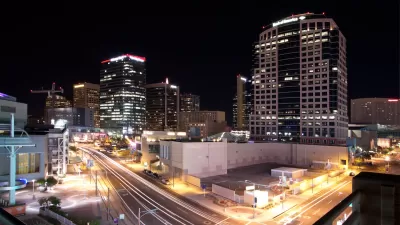A new law would allow cities to lower speed limits without going through an onerous state approval process.

A new Oregon law could let cities set their own speed limits on some roads, bypassing the long and often unsuccessful process by which cities have had to apply for lower speed limits until now.
Kea Wilson of Streetsblog reports on the proposed law, which would allow cities to more quickly adjust speed limits on dangerous roads and respond to community concerns. The law would not apply to interstate freeways or state-controlled roads, and would require cities to prove they can provide meaningful recommendations for new speeds.
A parallel proposal would improve safety on state-controlled roads by changing the calculation for speed limits, which, in most U.S. cities, is dictated by the “85th percentile rule,” setting the speed limit at the average speed that 85 percent of drivers travel. “Now, many Oregon roads will be subject to a significantly safer 50th percentile rule, wherein the slowest half of drivers on the road will set the standard,” along with road conditions and adjacent businesses and developments.
According to Wilson, Portland is already engaged in an effort to reduce speed limits on many of its roads. “As part of a separate effort, the city already won the right to slow to 20 miles per hour in 2018, and it’s continuing to redesign its roads to reinforce those limits as fast as possible.”
FULL STORY: Most Cities Can’t Set Their Own Speed Limits — But Maybe They Should

Study: Maui’s Plan to Convert Vacation Rentals to Long-Term Housing Could Cause Nearly $1 Billion Economic Loss
The plan would reduce visitor accommodation by 25,% resulting in 1,900 jobs lost.

North Texas Transit Leaders Tout Benefits of TOD for Growing Region
At a summit focused on transit-oriented development, policymakers discussed how North Texas’ expanded light rail system can serve as a tool for economic growth.

Why Should We Subsidize Public Transportation?
Many public transit agencies face financial stress due to rising costs, declining fare revenue, and declining subsidies. Transit advocates must provide a strong business case for increasing public transit funding.

Alabama: Trump Terminates Settlements for Black Communities Harmed By Raw Sewage
Trump deemed the landmark civil rights agreement “illegal DEI and environmental justice policy.”

Dear Tesla Driver: “It’s not You, It’s Him.”
Amidst a booming bumper sticker industry, one writer offers solace to those asking, “Does this car make me look fascist?”

A Visual Celebration of Manhattan’s Chinatown Elder Community, Through Food
Lanterns, cafeteria trays, and community connection take center stage in this stunning photo essay.
Urban Design for Planners 1: Software Tools
This six-course series explores essential urban design concepts using open source software and equips planners with the tools they need to participate fully in the urban design process.
Planning for Universal Design
Learn the tools for implementing Universal Design in planning regulations.
City of Santa Clarita
Ascent Environmental
Institute for Housing and Urban Development Studies (IHS)
City of Grandview
Harvard GSD Executive Education
Toledo-Lucas County Plan Commissions
Salt Lake City
NYU Wagner Graduate School of Public Service





























